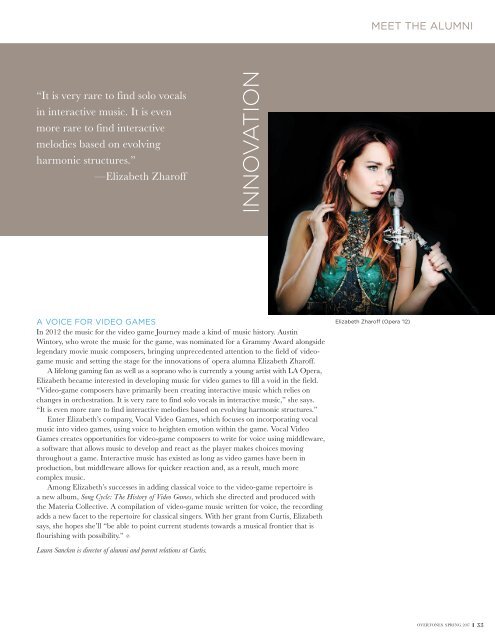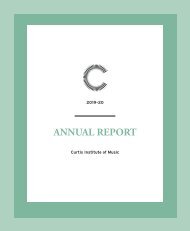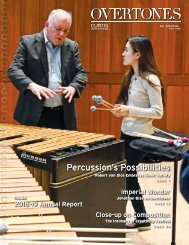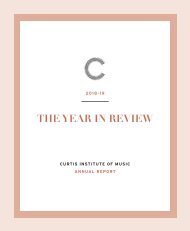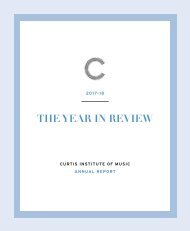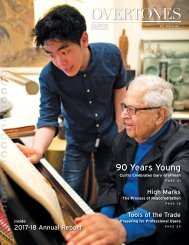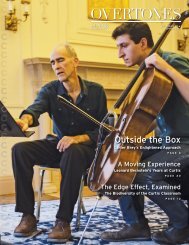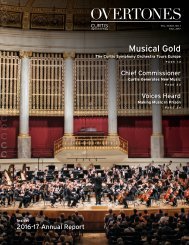Overtones: Spring 2017
Overtones is the semi-annual magazine of the Curtis Institute of Music. The latest issue highlights Curtis’s unique conducting fellows program, residencies by today’s leading composers, a compelling new way of presenting string quartets in performance, and more.
Overtones is the semi-annual magazine of the Curtis Institute of Music. The latest issue highlights Curtis’s unique conducting fellows program, residencies by today’s leading composers, a compelling new way of presenting string quartets in performance, and more.
Create successful ePaper yourself
Turn your PDF publications into a flip-book with our unique Google optimized e-Paper software.
MEET THE ALUMNI<br />
“It is very rare to find solo vocals<br />
in interactive music. It is even<br />
more rare to find interactive<br />
melodies based on evolving<br />
harmonic structures.”<br />
—Elizabeth Zharoff<br />
INNOVATION<br />
A VOICE FOR VIDEO GAMES<br />
In 2012 the music for the video game Journey made a kind of music history. Austin<br />
Wintory, who wrote the music for the game, was nominated for a Grammy Award alongside<br />
legendary movie music composers, bringing unprecedented attention to the field of videogame<br />
music and setting the stage for the innovations of opera alumna Elizabeth Zharoff.<br />
A lifelong gaming fan as well as a soprano who is currently a young artist with LA Opera,<br />
Elizabeth became interested in developing music for video games to fill a void in the field.<br />
“Video-game composers have primarily been creating interactive music which relies on<br />
changes in orchestration. It is very rare to find solo vocals in interactive music,” she says.<br />
“It is even more rare to find interactive melodies based on evolving harmonic structures.”<br />
Enter Elizabeth’s company, Vocal Video Games, which focuses on incorporating vocal<br />
music into video games, using voice to heighten emotion within the game. Vocal Video<br />
Games creates opportunities for video-game composers to write for voice using middleware,<br />
a software that allows music to develop and react as the player makes choices moving<br />
throughout a game. Interactive music has existed as long as video games have been in<br />
production, but middleware allows for quicker reaction and, as a result, much more<br />
complex music.<br />
Among Elizabeth’s successes in adding classical voice to the video-game repertoire is<br />
a new album, Song Cycle: The History of Video Games, which she directed and produced with<br />
the Materia Collective. A compilation of video-game music written for voice, the recording<br />
adds a new facet to the repertoire for classical singers. With her grant from Curtis, Elizabeth<br />
says, she hopes she’ll “be able to point current students towards a musical frontier that is<br />
flourishing with possibility.” <br />
Elizabeth Zharoff (Opera ’12)<br />
Laura Sancken is director of alumni and parent relations at Curtis.<br />
OVERTONES SPRING <strong>2017</strong><br />
33


